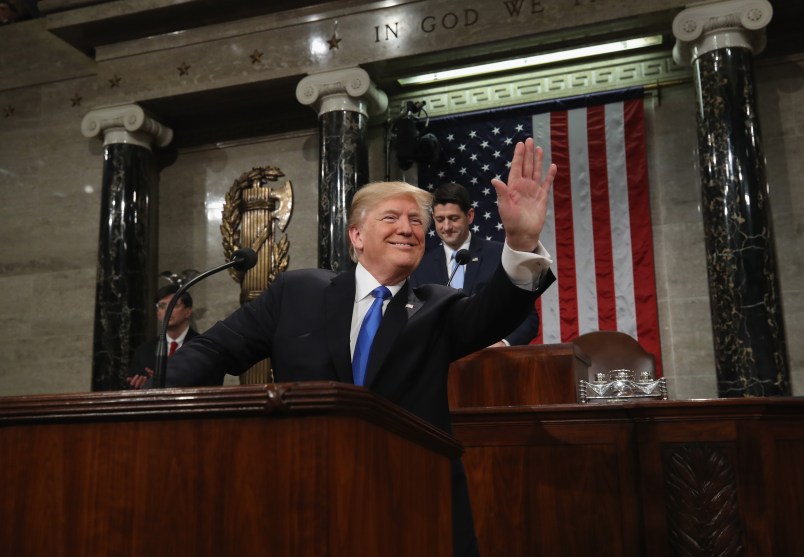President Donald Trump spent much of his first State of the Union speech focusing on his controversial immigration proposal, which would slash legal immigration by at least 44 percent in exchange for extending a path to citizenship to about 1.8 million immigrants who were brought to the United States as children.
In his remarks, which were met with loud boos from Democratic lawmakers, Trump made several inaccurate statements about the current immigration system, particularly about the diversity visa lottery and the process for family sponsorship, which Republicans refer to as “chain migration.”
“Under the current broken system, a single immigrant can bring in virtually unlimited numbers of distant relatives,” Trump claimed. “Under our plan, we focus on the immediate family by limiting sponsorships to spouses and minor children. This vital reform is necessary, not just for our economy, but for our security, and our future.”
In fact, both citizens and green card holders are quite limited in which family members they can sponsor. Under current law, citizens can only sponsor a spouse, a child, a parent, or a sibling. Legal permanent residents can only sponsor spouses and children who are unmarried and under 21 years old. All admissions are subject to “favorable exercise of USCIS’ discretion,” there are numerical caps for family-based immigration every year, and the wait time for approval could last anywhere from a few months to a few decades.
Additionally, Trump’s description in his address of the visa lottery program — alleging that it is “a program that randomly hands out green cards without any regard for skill, merit, or the safety of our people” — is misleading in multiple ways.
First, the program requires that applicants show either educational achievement or work-experience in order to gain admission. Those entering the visa lottery must have “at least a high school education or its equivalent or, within the past five years, have two years of work experience in an occupation requiring at least two years training or experience,” according to State Department regulations.
In fact, a new study by the Center for Global Development found that Trump’s immigration plan would reduce the average level of education among immigrants admitted to the United States.
“For example, about 41 percent of immigrants in the New Immigrant Survey who acquired permanent residency through the Diversity Visa have a university degree or more, and the reforms seek to eliminate this visa,” the study said.
Millions of applicants enter the pool, which ultimately ends with upwards of 50,000 people, mostly coming from countries with low immigration rates, getting visas. The lottery is designed to create a more diverse mix of countries where visa recipients are hailing from.
As for Trump’s claim that the program “hands out green cards without any regard for ….safety of our people,” applicants chosen by the lottery are subjected to intensive background checks before being granted visas.
As Politifact noted, the State Department’s Deputy Inspector General Anne Patterson detailed in 2004 in testimony to Congress, the vetting process applicants must go through. “Consular officers interview all diversity visa winners and check police and medical records once applicants begin the actual visa application process,” she said.







Racist liar lies about immigrants. In other news, dog bites man.
Lord, I know I sound like a broken record, but his shit-eating “smile” is sickening. Absolutely toxic. OSHA clean-up at the SOTU–STAT!
“Fibbin”?, “Misleading”?
C’mon already! He is a LIAR! Say it for what it is! Why sugarcoat it?
He either doesn’t know or care how this stuff works. He gladly spews ignorance about it or willfully misleads. No surprises yet.
Well, we knew he was going to lie, so is this it? (I can’t bring myself to watch).